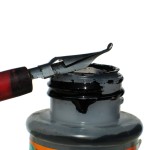How To Learn Communicative Czech In 1 month – Results Of My Czech Mission

Finally, after some delay (due to my laziness in writing!) I’m proud to present the results and final thoughts concerning my language mission. If you haven’t been following my struggles, you can find all the details below.
The purpose of the mission
My mission had a dual purpose.
First of all, I wanted to demonstrate that it is perfectly possible to learn REALLY FAST. assuming of course that you
- use some mnemonics
- disregard almost all the advice you’ve ever heard in your life regarding (language) learning, but more about that later
Secondly, I wanted to ENCOURAGE YOU to think more seriously about your learning; to be BETTER. To question what you know. My learning philosophy is simple – experiment to see what does and what doesn’t work.
To put it brutally – if a horse is sick, you don’t pretend that everything is fine, try to ride or show it to your friends and say “it needs a little bit more time to get better, that’s all”. No. It won’t get better. You take a shotgun, lead a horse behind a barn and put it out of its misery. It’s that simple.
It’s simple. But it’s not easy. If you’ve been using the same ol’ methods for years, it’s hard to kiss them goodbye. I know.
Time Restrictions
Start date: 1st February 2015
End date: 2nd March 2015
Total time: 30 days
Main Goals of The Mission
- Memorize 100 words per day for 30 days in the row
- Get to at least a B1 level
- Assess my language skills
My Learning Materials
- Outline of Czech Grammar by David S. Danaher
- Stand Alone Czech by Laura A. Janda and Charles E. Townsend
- Pocket dictionary
- And following Anki decks: 1, 2 and 3.
Money Spent
About 3$. That’s the cost of my pocket dictionary.
Disclosure
It’s my duty to mention that I had following pre-exisitng advantages before the start of my mission:
I could already speak 8 languages
Including 2 Slavic languages; one of them is my mother tongue – Polish. It simply means that I could understand, right away, all the grammar constructions I stumbled across.
Also, the vocabulary between these languages is quite similar.
And finally, due to the language similarities, my listening skills were at quite a high level from the very beginning.
I had a profound knowledge of mnemonics
I’ve been experimenting with my own mnemonics systems for years and I’ve created the ones which work great for me.
Update 2017: A couple of months after this mission ended, I had to relearn all the words. Read more about severe limitations of mnemonics.
The Difficulty of Czech
You can read more about it right here.
The Time Spent On The Mission
Altogether I spent about 140 hours during the duration of my mission. What was frustrating is that I had to spend about half of that time preparing the vocabulary lists!
Results
- Results of the first test: level C1.1
Here are some more details:
- The test consists of three parts.
- There is a time limit of 30 minutes for each part.
- The second and third parts can be entered only if you reach a minimum score.
- The minimum score for entering part 2 is 40 points.
- The minimum score for entering part 3 is 70 points (score in part 1 + part 2).
I managed to complete the test in 33 minutes and went through all 3 parts of it.
- Results of the second test: level B2
Here are some more details:
- Make sure you do not spend more than 40 minutes on doing the test.
- You should not use any dictionary or any other help so that the result accurately reflects your knowledge.
- Stop filling in and submit the test as soon as the questions are too difficult for you (Do not guess the answers).
- If you are a complete beginner, there is no need to do the test.
Both tests concentrated only on the grammar use and reading comprehension. If you don’t know what these silly letters mean – don’t worry. Simply read Common European Framework of Reference for Languages.
The Weaknesses of The Self-Assessment
Generally, the overall performance is calculated by averaging the scores you achieve in Reading, Writing, Listening, Speaking and Grammar.
I had a chance to test all of them (except writing skills). However, some language competences had to be assessed by myself, not by a qualified teacher. It leaves definitely a lot of room for personal bias but it was impossible to avoid considering the nature of such an undertaking.
On a side note, I’ve been working as a language assessor for some time now, so I can only hope that my judgment is precise enough.
Did I Succeed?
Yep, I feel that I accomplished all the main goals of my mission:
Number of words
Altogether I’ve memorized about 3100 words. About 2860 of them are the words from my ANKI list, the rest of them are noted separately on a few pieces of paper.
Including my knowledge of the rules of word formation, my total vocabulary size should amount to about 4,5 – 6,5k words.
Level
Considering the results of official and unofficial language assessment, I would assess my level as B1.2. In other words – somewhere between B1 and B2 level.
Articles Related To The Mission
If you haven’t had a chance to do it already, here are some articles (more to come!) describing my approach to learning Czech (or should I say – learning in general).
- The word substitution technique – how to considerably increase your vocabulary size
- Not sure if you sound natural in a language you learn? Create your own feedback loop within one minute!













I come back to this article as I’m trying to tackle German. I wondered what percentage of the time spent (around 5h a day) you allocated to Anki vocabulary memorization compared to grammar.
I also wondered how you reach fluency in the sense that you can use the words you memorized naturally in a sentence?
For instance, my Russian Anki deck is around 5000words, I can read any blogs and understand most movies, but when it comes to articulating the words I know in a proper sentence, I am weak. I tend to stick to overly short and simple sentences despite my wide vocabulary. I’ve also inputted sentences in my Anki as I went to get used to the words in context, but those were short sentences too.
I thought reading might do the trick, but that may be a bit too passive and slow.
Perhaps writing?
I would love to hear your take on that.
This is not a good article if you’re looking for something to emulate. I would rather follow the advice from this case study:
https://universeofmemory.com/german-from-the-scratch-b2-5-months/
The reason being is that, as I have mentioned, I have had the advantage of knowing lots of languages, and I could skip many steps that normally would have to be taken.
(1) I also wondered how you reach fluency in the sense that you can use the words you memorized naturally in a sentence?
Too much to explain. That’s why I have a huge course on that topic. What’s more, at the time, I heavily focused on mnemonics, and it definitely backfired.
(2) I also wondered how you reach fluency in the sense that you can use the words you memorized naturally in a sentence?
I could use them in sentences but, considering the level, it wasn’t always very natural. It’s not what being on B1 or B2 level means.
Generally, in the beginning, I recommend sticking almost exclusively to active learning. Starting with level B1/B2, you can gradually start incorporating more and more passive learning into your learning plan.
Of course, even those guidelines can be modified by your current background knowledge.
Ahoj!
Would it be possible for me to use the anki vocabulary decks that you used to learn czech? I tried to click the hyperlinks, but they are no longer available unfortunately.
Ahoj! 🙂 I would love to share them with you but I don’t have them anymore. Back in the day, I was sure that those decks stay in ANKI repository almost forever. It turns out they are deleted regularly.
Ahoj,
dobry 🙂 C1 je super, ale podle me je to i dost tim, ze polština a cestina jsou podobny. Nicmene mas uplne skvely blok a jsem ted vic motivovaná se na tu němčinu poradne vrhnout . 😀
Ahoj!
VIm ze to neni zadna slava!;) A podobnost byla důležitá. To jsem zmínil v mém článku! 🙂
Děkuji za milá slova a hodně štěstí! 🙂
Hej.
Masz może gotowe karty do Anki do niemieckiego albo do angielskiego(które sam zrobiłeś)?Jeśli tak to możesz się podzielić? Dodaje słówka według twojego wzoru z joke- bromear w innym artykule. Jest to bardzo skuteczny sposób ale wyczerpujący i czasochłonny. Dodanie 20 słów trwa około godziny.jeśli chciałbym ogarniać 100 słów dziennie to 4 czy 5 godzin zajmuje samo tworzenie kart. Same powtórki to luz. Mam wrażenie że z Anki mogę podbić świat gdyby tylko nie to tworzenie kart. Ile kart Ty jesteś w stanie utworzyć w godzinę?
Dzięki za Twoje artykuły. Dajesz mi moc.
Hej!
Mam gotowe karty, ale dla Ciebie i kazdej innej osoby beda bezuyzteczne. Zawsze tworz wlasn ekarty jesli tylko masz taka mozliwosc.
Drastycznie zwieksza to wspolczynnik retencji slownictwa.
Artykul, o ktorym ma na celu pokazanie tylko, jak bezsensownie ludzie ucza sie czesto slowek. Ja sam tworze swoje fiszki innymi metodami. Niektore z nich sa wspomniane w komentarz w tym artykule: https://www.universeofmemory.com/german-from-the-scratch-to-b2-5-months/ .
W zaleznosci od jezyka (i formy umyslowo-fizycznej danego dnia) tworze 30-60 fiszek na godzine.
Dziekuje, jak zawsze za mile slowa!
It is great that you had put in the hard work back then. But i would like to know how many hours did you study per day?
If my memory serves well it was about 5-6 hours per day 🙂